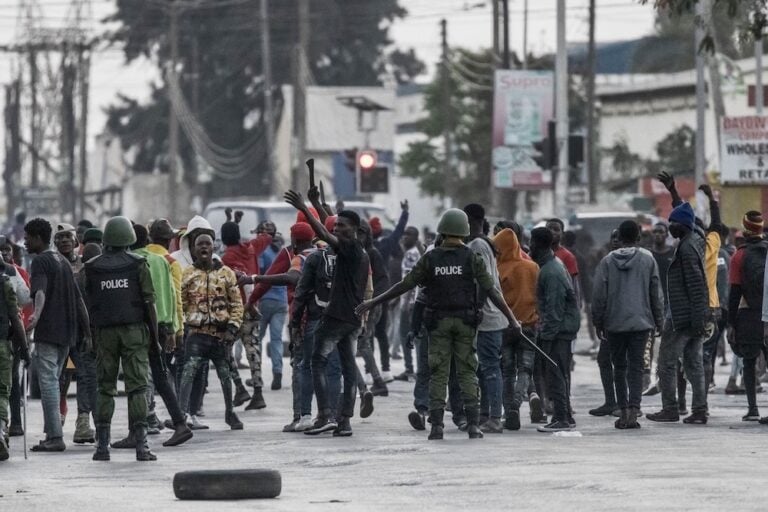(MISA/IFEX) – The “Post” newspaper appeared on the streets of Lusaka on the morning of 15 March 1999 as usual following a major police operation last week aimed at crippling the paper. **Updates IFEX alerts of 12 March, 11 March and 10 March 1999** The newspaper reports in its latest edition that the plan to […]
(MISA/IFEX) – The “Post” newspaper appeared on the streets of Lusaka on
the
morning of 15 March 1999 as usual following a major police operation
last
week aimed at crippling the paper.
**Updates IFEX alerts of 12 March, 11 March and 10 March 1999**
The newspaper reports in its latest edition that the plan to cripple the
paper was hatched and planned by officers from the Zambia Army Military
Intelligence and Security Services (MISS). The operation involved
arresting
all reporters and auxiliary staff of the paper and detaining them at
various
points in Lusaka. However, it apparently failed after only six reporters
were arrested, with the rest being able to give the police the slip. The
six
were apparently charged with espionage on 11 March, the night before
their
release on a writ of habeas corpus. However, lawyers who spoke to MISA
said
that the charges did not stand in the absence of a summons. They
indicated
though that a docket had been opened and that the charges could be
revived.
Meanwhile, the police’s siege of the newspaper’s editorial office and
printing press was called off on 12 March shortly after the
unconditional
release of the six detained journalists. The siege, which began at
around
7:00p.m. on the evening of 10 March, involved police surrounding the two
buildings and preventing anyone from entering or leaving. The action
successfully delayed the printing of the newspaper for several hours,
with
the result that it failed to appear on the streets of Lusaka on the
morning
of Thursday, 11 March as expected – the first time this had happened in
the
seven-year history of the paper. However, staff trapped in the building
of
the printing press still managed to print the paper by midday that same
day,
but police prevented it from being distributed. The Thursday edition
was,
however, sold openly on the streets the following day. No edition of the
“Post” appeared on 12 March because it was a public holiday in Zambia.
In another development, missing journalist Macpherson Muyumba, who at
one
time was also feared to have been arrested along with his colleagues,
has
surfaced. Muyumba managed to evade the police and went into hiding.
Background Information
The six journalists were arrested variously on the night of 9 March and
the
morning of 10 March apparently after an order for the police to arrest
all
“Post” journalists before dawn. Those arrested were: Brighton Phiri,
Kelvin
Shimo, Joe Kaunda, Amos Malupenga, Lubasi Katunda and Goodson Machona.
On
12 March, they were released unconditionally, following a habeas corpus
writ
brought by the paper.
The crackdown on the journalists followed an uproar caused in the
National
Assembly stemming from the lead story in the “Post” on 9 March. The
story
questioned the military capacity of Zambia to withstand an incursion
from
neighbouring Angola.
The article in question can be read on the Internet at:
http://www.zamnet.zm/zamnet/post.arch.20742/news/fpstory.html


